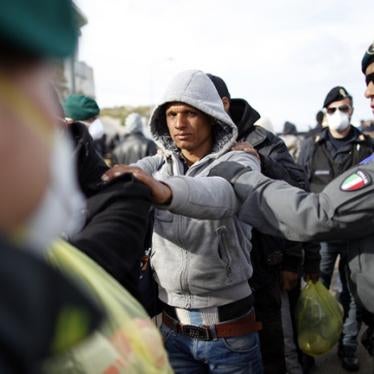To many friends of human rights in Europe, the Arab Spring has been the most thrilling period since the fall of the Berlin wall. Judging from their soaring rhetoric, European leaders share that enthusiasm. Europe has much to offer its friends in North Africa, the logic goes, when it comes to upholding rights for all.
The reality is far less edifying. EU governments proved reluctant to help refugees and migrants fleeing Libya, including people risking their lives at sea in rickety boats. European countries have been quick to resume migration cooperation with Libya, Egypt and Tunisia with the aim of speedily deporting migrants who reach Europe, including those originating from Sub-Saharan Africa. And the arrival of Tunisian migrants in Italy last year led to a row in which leading EU governments questioned aloud the value of free movement, a fundamental EU pillar.
When it comes to Europe’s domestic human rights record, the long-term trends are deeply worrying. As a new essay from Human Rights Watch explains, four trends stand out: the erosion of civil liberties in the fight against terrorism; the rise of populist extremist parties and their negative influence on mainstream politics; the declining effectiveness of traditional human rights institutions; and growing intolerance and abuse toward migrants and minorities. Taken together they amount to a crisis.
A core tenet of human rights is that they apply equally to everyone. But when it comes to ethnic minorities and migrants in Europe today, popular attitudes and political debate suggest otherwise. In polling data from 2010, a majority of those polled in eight EU states shared the view that there are too many immigrants, with as many as half of those responding concluding the same about Muslims.
EU Fundamental Rights Agency research shows that Muslims and Roma experience persistent hostility and discrimination across the region. Undocumented African migrants face significant problems, including discrimination and violence. While individual attacks are common, in some cases this has spilled into mob violence, including in Italy, Greece, Hungary and Slovakia.
Fears about loss of culture, concerns over terrorism and common criminality, and competition for economic resources all help explain why intolerance is growing across Europe. The current economic and financial crisis and resulting austerity are likely to exacerbate the problem.
Rather than assuaging public concern about the place of minorities and migrants, EU governments have instead responded in ways that are deeply corrosive of respect for universal rights. Instead of forcefully condemning racism and intolerance, and emphasizing a shared history shaped by migration and the many contributions made by minorities and migrants, governments have played on these fears.
The response has included blaming marginalized communities for the conduct of a handful of people (as with Roma in Italy); seeking to close Europe’s border at EU and national levels; restrictive and abusive asylum procedures and abusive migrant detention conditions (notably in Greece), and in the name of integration, telling migrants (even second or third generation) that they must either embrace majority culture, face sanctions or leave the country (in Germany, France, the Netherlands and elsewhere).
Fear of Muslims, linked to concerns about terrorism and loss of European culture, has driven wider policy debates about the place of migrants in society, and led to calls for forced integration.
Such efforts, and integration that requires no accommodation on the part of wider society, are doomed to fail. They reinforce xenophobia by playing into public fears and arguments from extremist parties about loss of culture. They assert a dangerous zero-sum conception of rights—minorities must accept majority culture (or “Christian values” as Angela Merkel suggested in 2010), and if they refuse to do so their rights must be set aside for the greater good.
The European Union is said to be founded on respect for human rights. But when it comes to protecting the rights of vulnerable and unpopular minorities, EU governments often prefer to rely on the principle of majority rule. As the European Parliament has observed, this damages the EU’s credibility in promoting rights around the world. But above all it undermines the ideals that Europe is supposed to represent. Without concerted action to reverse this trend, the next generation of Europeans may see human rights as an optional extra instead of a core value.
Benjamin Ward is deputy Europe and Central Asia division director at Human Rights Watch.








